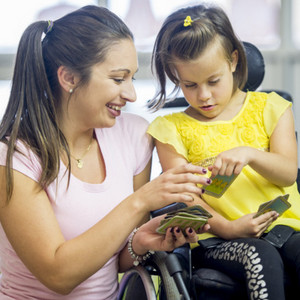Common Struggles for Special Needs Students
It is important that teachers strive to create positive experiences and holistic learning environments for diverse learners. Children with special needs often have difficulty communicating, learning, socializing, and accessing resources in the classroom. An inclusive classroom enables all children to have access to the support required for them to learn, play, and communicate with ease.
Although special needs refer to a range of cognitive, physical, sensory, emotional, and language impairments, there are some struggles which can be considered specific to children who have special needs. These characteristics may be used to recognize a child who requires specialized attention and instruction in the classroom.
Accessibility
Accessibility encompasses the design of environments, products, information, and services to be used by individuals with diverse abilities and disabilities. Children with special needs face significant challenges related to accessibility in various aspects of their lives.
In the educational context, classrooms may not be designed to accommodate wheelchairs or other mobility aids, making it difficult for many children to fully participate in class activities.
Other children with special needs who have speech or language disorders may struggle to communicate their thoughts and requirements because of limited accessibility to assistive technology and speech therapists. Additionally, children with visual impairments may not be able to access educational materials or information because they may not be provided in accessible formats like large prints, Braille, or with screen readers.
Most importantly, attitudes and misconceptions about disabilities can create barriers to inclusion and limit opportunities for children with special needs. It is crucial for educational institutes and communities to work together to create inclusive environments, promote awareness, and provide necessary support services so that every child has access to equitable opportunities.
Lack of Peer Support
Peer support plays an important role in every child’s development, helping them to build a sense of belonging and create lasting bonds with others. Many children with special needs experience a lack of peer support, which can have significant social and emotional implications. Such isolation is caused by various factors, such as social differences, stereotyping and stigma, lack of general awareness about disabilities, and communication difficulties.
Children with special needs may exhibit communication patterns and social behaviors (such as difficulty with non-verbal cues and maintaining eye contact) that make it challenging for them to connect with their peers due to misinterpretations and misunderstandings. They may also experience stigma and negative stereotyping due to their visibly different behaviors, which can lead to exclusion and bullying. Many neurotypical children and children without disabilities lack awareness about the specific needs and challenges of children with special needs, which may lead to unintentional exclusion or insensitive behaviors.
To address the lack of peer support for children with special needs, it is important to raise awareness about disabilities, promote inclusion, and foster empathy and acceptance among peers. Through activities like circle time sharing, social stories, peer-led lessons and tutoring, teachers can create inclusive learning environments and help children to collaborate and build positive relations with each other.
Academic Challenges
All students encounter unique learning challenges in the classroom. Because of the various cognitive, physical, communicative, and social difficulties that they experience, many children with special needs approach learning in ways that differ from their peers. In most instances, educational programs in schools are primarily designed for typically developing students, making it important for children with special needs to have access to learning resources and support that specifically cater to their own requirements.
While they may experience academic challenges, it is important for teachers to understand that their difficulties do not stem from a lack of effort. All children with special needs have the potential to learn and grow with the help of personalized attention, tailored classroom accommodations, and support from both their teachers and peers. A good academic record cannot be divorced from a child’s access to the required resources and assistance and is often reflective of the individualized support they are provided.
Learn more about common struggles for special needs students with the online PD course: Teaching Special Needs Students.

About the Author
Ellen Paxton is a respected expert in education and best known as the Chief Learning Officer of Professional Learning Board. As a two-time National Board Certified Teacher, Ellen has successfully published and customized online professional development courses and Learning Management Systems for 20 years to help teachers meet their state continuing education renewal credit requirements.
Through ProfessionalLearningBoard.com, RenewaTeachingLicense.com, and ConnectedPD.com. Ellen has established solutions and maintained partnerships with several accredited universities, higher education institutions, teachers’ unions and state Departments of Education while setting strategic direction that makes a difference and overseeing implementation of popular online PD.

Comments are closed.